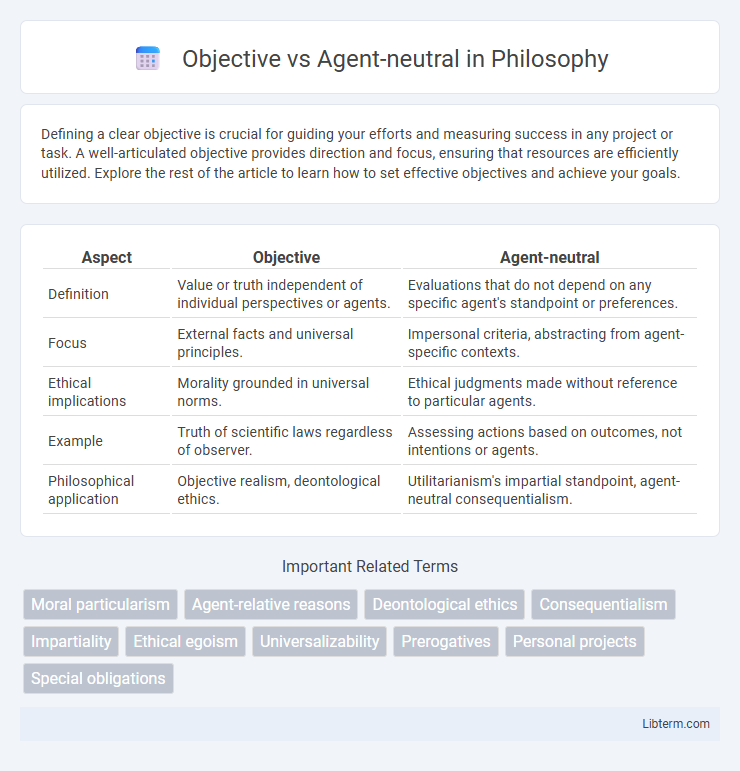Defining a clear objective is crucial for guiding your efforts and measuring success in any project or task. A well-articulated objective provides direction and focus, ensuring that resources are efficiently utilized. Explore the rest of the article to learn how to set effective objectives and achieve your goals.
Table of Comparison
| Aspect | Objective | Agent-neutral |
|---|---|---|
| Definition | Value or truth independent of individual perspectives or agents. | Evaluations that do not depend on any specific agent's standpoint or preferences. |
| Focus | External facts and universal principles. | Impersonal criteria, abstracting from agent-specific contexts. |
| Ethical implications | Morality grounded in universal norms. | Ethical judgments made without reference to particular agents. |
| Example | Truth of scientific laws regardless of observer. | Assessing actions based on outcomes, not intentions or agents. |
| Philosophical application | Objective realism, deontological ethics. | Utilitarianism's impartial standpoint, agent-neutral consequentialism. |
Introduction to Objective and Agent-Neutral Perspectives
Objective perspectives emphasize unbiased observation based on measurable facts, prioritizing empirical evidence and universal truths. Agent-neutral viewpoints seek to evaluate situations without attributing outcomes to specific individuals, focusing instead on impartial principles and systemic effects. Understanding the distinction between objective and agent-neutral approaches aids in applying consistent ethical reasoning across diverse contexts.
Defining Objective in Philosophical Context
Objective in philosophical context refers to truths or realities that exist independently of individual beliefs, emotions, or perceptions, emphasizing universality and impartiality. It contrasts with agent-neutral perspectives by focusing on facts or principles valid regardless of any observer's standpoint. This notion underpins epistemology and ethics, where objective standards guide justification and moral reasoning beyond subjective biases.
Understanding Agent-Neutral Ethics
Agent-neutral ethics centers on impartial moral principles that apply universally, regardless of the individual's role or standpoint, emphasizing fairness and equality in ethical decision-making. Objective ethics, by contrast, refers to moral standards believed to be universally true and independent of personal beliefs or agents. Understanding agent-neutral ethics involves exploring how ethical judgments prioritize collective well-being over individual preferences and how this perspective influences normative ethical theories such as utilitarianism and Kantianism.
Key Differences: Objective vs Agent-Neutral
Objective statements emphasize observable facts and measurable outcomes, prioritizing clarity and impartiality in communication. Agent-neutral statements avoid specifying the actor responsible, focusing on the action or event itself to reduce bias and ensure inclusivity. Key differences lie in the presence of an explicit agent in objective statements versus the omission of the agent in agent-neutral expressions to maintain neutrality.
Historical Background of Both Approaches
The objective approach, rooted in early 20th-century positivism, emphasizes observable phenomena and measurable outcomes, influencing disciplines like psychology and linguistics with its focus on external reality. The agent-neutral perspective emerged as a response, gaining traction in the mid-20th century within philosophy and cognitive science by prioritizing context-independent analysis of actions and events without attributing them to specific agents. These historically distinct frameworks reflect evolving attempts to balance empirical rigor with interpretative flexibility across scientific and philosophical methodologies.
Major Philosophers and Theories Involved
Objective theories, notably advanced by Immanuel Kant and G.E. Moore, emphasize moral truths as universal and independent of individual perspectives, grounding ethics in rationality and intrinsic moral facts. Agent-neutral theories, as discussed by Peter Singer and Derek Parfit, prioritize impartiality and the equal consideration of all agents' interests, aligning with utilitarianism and consequentialist frameworks that assess actions by their outcomes irrespective of the agent's personal connections. The debate between these perspectives centers on whether moral judgments should be based on objective principles valid for all agents or on considerations that remain neutral to the agent's identity and specific circumstances.
Practical Implications in Moral Decision-Making
Objective moral frameworks emphasize universally applicable principles, ensuring consistency in ethical decision-making across situations. Agent-neutral approaches prioritize impartiality, focusing on outcomes that benefit the greatest number regardless of the individual's identity or perspective. Practical implications include challenges in balancing fairness with personal responsibility, as agent-neutrality can override personal commitments, while objective ethics demand unwavering adherence to moral rules.
Criticisms of Objective Moral Frameworks
Objective moral frameworks often face criticism for their perceived rigidity, as they mandate universal moral truths that may overlook cultural and individual differences. These frameworks can struggle to account for the complexity of moral situations by ignoring agents' intentions and contextual factors. Critics argue that this neglect of subjectivity limits the ability of objective ethics to fully capture the nuances of human morality.
Limitations of Agent-Neutral Standpoints
Agent-neutral standpoints often struggle with capturing context-specific motivations and responsibilities, limiting their effectiveness in ethical and decision-making frameworks. These standpoints may oversimplify complex social dynamics by ignoring individual agents' intentions and roles, which are crucial for accurate moral assessments. Consequently, relying solely on agent-neutral perspectives can lead to incomplete or unjust outcomes in applied ethical analysis.
Conclusion: Weighing Objective vs Agent-Neutral Ethics
Objective ethics emphasizes universal moral principles applicable regardless of personal perspectives, while agent-neutral ethics prioritizes impartiality by focusing on outcomes beneficial to all agents equally. Weighing these approaches highlights that objective ethics offers consistency and clarity in moral judgment, whereas agent-neutral ethics fosters fairness and equality by disregarding the identity of the moral agent. Choosing between them depends on whether the ethical framework values absolute standards or equitable consideration of all agents involved.
Objective Infographic

 libterm.com
libterm.com